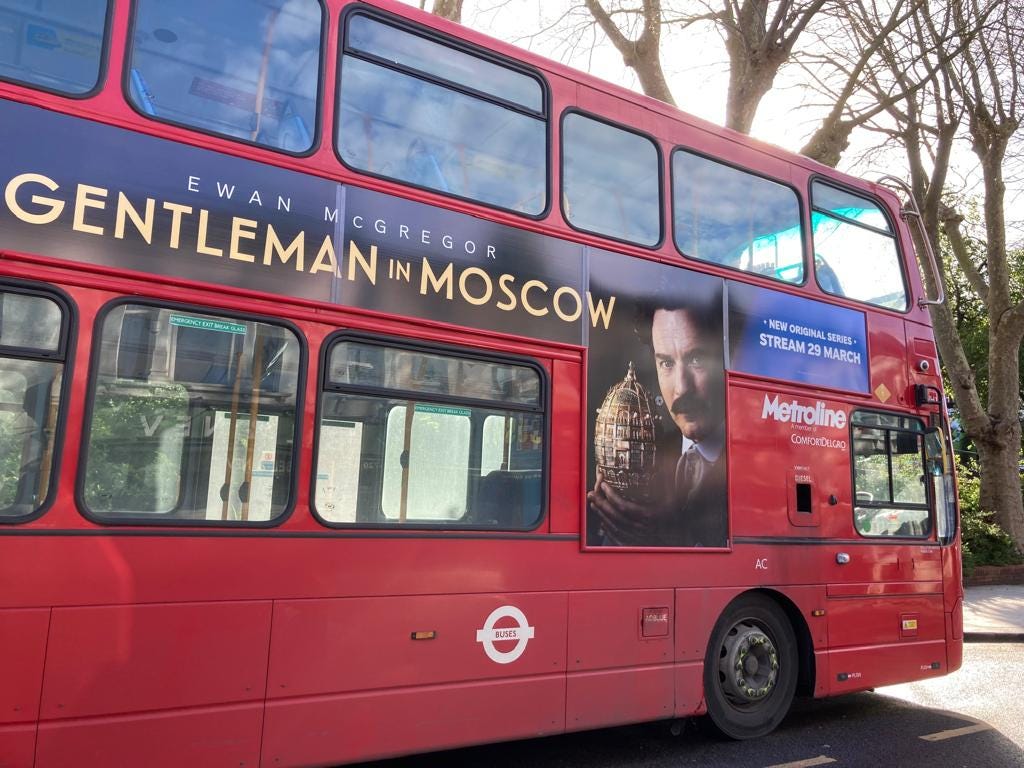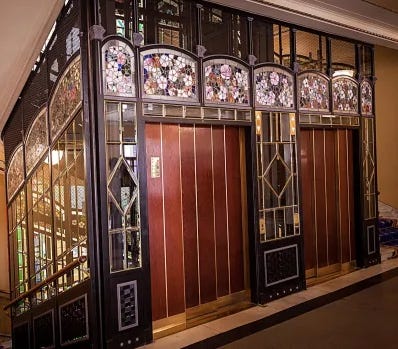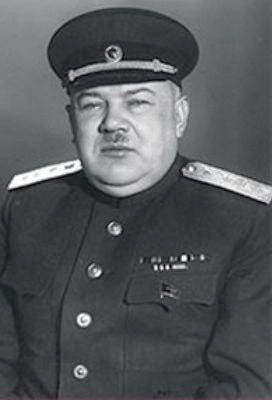In the TV adaptation of Amor Towles’s novel, A Gentleman in Moscow, we meet the staff of the Metropol Hotel – from the manager to the head chef and the waiters, receptionists and even a seamstress. But one member of staff is missing, someone familiar to anyone who has spent a night in a Soviet hotel: the dezhurnaya, known to tourists as the ‘key lady’. This is the woman – never a man – who sat day and night on each floor by the lift or the stairs, noting the comings and goings in her corridor and policing the morality of the guests.
Officially her task was to hand over a room key to a guest on presentation of a hotel card, which was issued at reception in exchange for a passport. Rarely was this done with a smile. ‘Most have the mentality of a sentry – gruff, suspicious of aliens, protective of turf, and accustomed to reducing human commerce to the inspection of a permit,’ wrote Hedrick Smith, a Moscow correspondent in the 1970s.
A determined guest could draw out some human warmth from behind her bureaucrat’s scowl and a key lady could be helpful and even talkative, but suspicion was the norm.

I remember once staying in the Metropol and telling the dezhurnaya that my wife would be joining me a day later. ‘That’s what they all say,’ came the gruff reply. Her role was to bar entry to the escort girls who buzzed around the hotel, except those approved by the KGB to consort with foreigners.
These ever-vigilant women do not appear in the glossy version of the Metropol Hotel as seen in the TV adaptation of Towles’s novel. Count Rostov is never confronted by the guardians of the corridor, even when half-dressed and carrying his shoes in his hands in the middle of the night after being unceremoniously kicked out of his angry lover’s suite. The count roams freely around the Metropol, which makes it unlike any Soviet hotel I have ever known.
In my book, The Red Hotel: the Untold Story of Stalin’s Propaganda War which describes life in the Metropol in the 1940s, I write that unauthorised contact between foreign reporters and Soviet citizens was not just discouraged but was a criminal offence. Inside the hotel, it was the key ladies who were in charge of stifling any fraternisation between the Anglo-American press corps and Soviet citizens.
Eddy Gilmore was one of the American correspondents living in the Metropol in wartime. One day he got into the lift. As it was about to begin its trembling ascent, someone banged on the metal grating with a stick and demanded to be let in. The liftman opened the door and in strode a Soviet army general in full dress uniform, the gold star of hero of the Soviet Union gleaming on his chest. Gilmore recognised General Andrei Eremenko, one of the heroes of the defence of Stalingrad. Buoyed up by the cocktails he had drunk at a US embassy party, Gilmore introduced himself to the general – who clearly had had a few drinks somewhere else – and the journalist reminded him that they had met on a press trip to Stalingrad in 1943. When the lift stopped at the second floor, the general was still chatting animatedly. He ordered the liftman to wait. ‘Close the door and keep it shut until I tell you to open it.’
The lift bell kept ringing, as other guests summoned it, and the liftman looked anxious, but the general carried on speaking to his new friend. A concierge appeared and begged the general through the grating to vacate the lift, which he reluctantly did. The conversation continued on the landing, and Gilmore could see the dezhurnaya watching the unusual spectacle on her floor and then picking up her phone. The journalist tried to steer the general into one of the hotel’s dark corridors, but the old soldier would not take the hint.
A young man in a blue serge suite appeared from nowhere, one of the many who could be seen lolling around the hotel lobby day and night. Gilmore invited the general to join him for dinner, and the general readily accepted. At this, the man in the blue suit approached the general, looked him in the eye and said two words, ‘Comrade General…’
That was all it took for the hero of Stalingrad to crumple. ‘I’m sorry it’s impossible for me to have dinner with you,’ he told Gilmore.
A few drinks could loosen the tongues of Soviet grandees and dissolve their ingrained distrust of foreigners, but the key ladies were always there to restore order. The Metropol was a place of secrets, where guests and permanent residents shared a corridor but lived in separate worlds. The foreign journalists ate in one room, their translators in another, and the permanent residents – a mixture of serving bureaucrats and ageing revolutionaries – heated up their rations on primus stoves in their rooms.
The best kept secret was the presence in the Metropol of a man who in the early 1930s could be seen playing chess in one of the hotel’s capacious corridors – they were wide enough to fit a table and two chairs. This was Vassily Ulrich, a quiet man running to fat whose only interest in life appeared to be his butterfly collection. He had good reason to stay in the shadows: he was the presiding judge at the show trials of the 1930s when thousands of Stalin’s political rivals – and all types of imaginary enemies – were sentenced to death on charges of treason. In the years 1936-38 Ulrich signed a total of 3,146 execution orders, cementing his reputation as Stalin’s ‘executioner no. 1’.
These victims were taken to basements around Moscow and shot in the back of the head. One of the most prominent was Nikolai Bukharin, a popular and charismatic Communist Party theorist purged by Stalin. After Bukharin’s death Ulrich got an upgrade from his standard Metropol room: he took possession of the three-room suite that had been home to Bukharin and his family.
All the foreign journalists in Moscow wanted to find out the secrets of Stalin’s purges: how had the elite of the Communist Party been made to confess in open court to taking part in implausible conspiracies? As far as I know, none of the journalists who lived in the Metropol from 1941-45 was aware that Ulrich, a ‘uniformed toad with watery eyes’ in the words of one of his victims, lived among them and knew all the answers. The journalists’ Soviet assistants could be indiscreet, but they knew better than to reveal the identity of the toad down the corridor. Lacking any charisma, Ulrich was a compliant yes-man who ordered executions with the same insouciance that he despatched butterflies in his killing jar.
Towards the end of the 1980s, the economic crisis of the Soviet Union and Mikhail Gorbachev’s attempts to reform the system forced the hotel industry to rethink their staffing levels: they were twice the levels of those in eastern Europe and three or more times higher than in western Europe. The key ladies began to disappear. As late as 1987, an American visitor to Moscow was staying in the vast Rossiya hotel complex when a fire broke out. The guests smelled smoke and banged on doors to rouse their neighbours. Throughout the commotion the dezhurnaya remained sitting at her desk, awaiting orders – the embodiment of Brezhnev’s ‘era of stagnation’ that had paralysed the country.
As late as 2007, there was a stark reminder of the old days in the shabby Peking Hotel. The deep marks made in the carpet by the dezhurnaya’s desk and chair over many years were still visible on every floor.
No portrayal of a Soviet hotel is complete without the dezhurnaya. To tourists, she appeared to be a minor inconvenience, but in reality she was a vital cog in a huge surveillance machine.
An eight-part TV adaptation of ‘A Gentleman in Moscow’ is available for streaming on Paramount+. ‘The Red Hotel: The Untold Story of Stalin’s Propaganda War’ is now in paperback in the UK https://www.amazon.co.uk/Red-Hotel-Untold-Stalins-Disinformation/dp/1035401339/ref=monarch_sidesheet






Brilliant, Alan. I had never heard of Ulrich before. One of the things I loved about being Moscow Correspondent, even in the 2000s, was this notion that the city was full of secrets - some historical, others contemporary. Some of my favourite stories were tracking down Stalin's granddaughter, or Beria's last lover.
May I share my own dezhurnaya story? One night, while staying at the hulking behemoth that was the Rossiya hotel (now demolished) on Red Square, a friend and I returned about 3am from one of Moscow's covert gay discos . . .
'Where have you been, boys?' the dezhurnaya asked, looking up from her knitting.
Out dancing, we replied.
'Where?' she asked.
At a disco, we replied.
Her next question (to which we just mumbled goodnight): 'And were there lots of girls?'